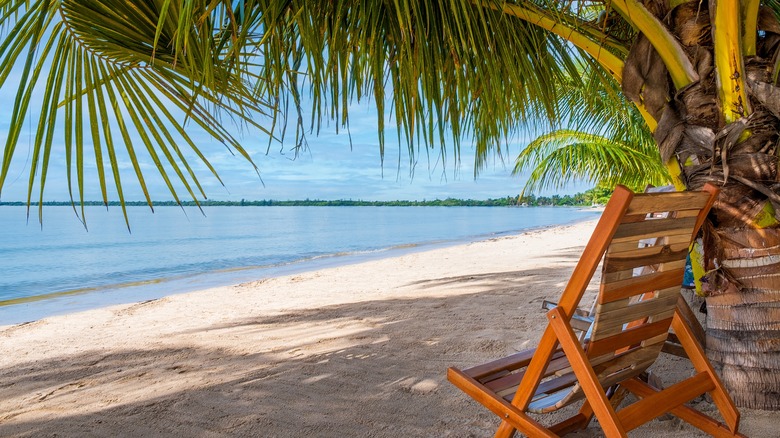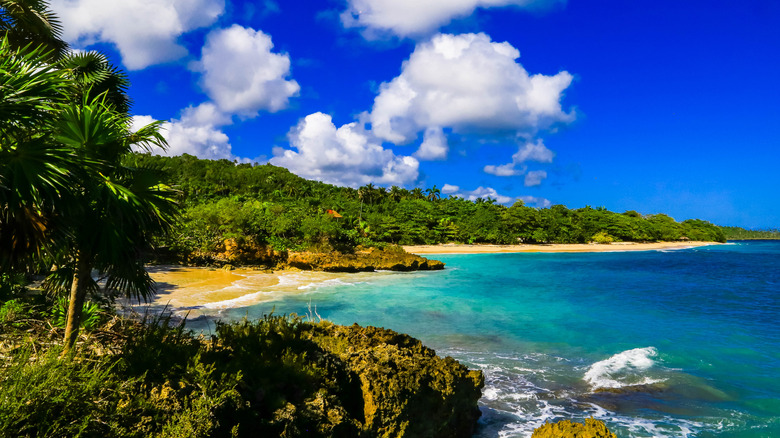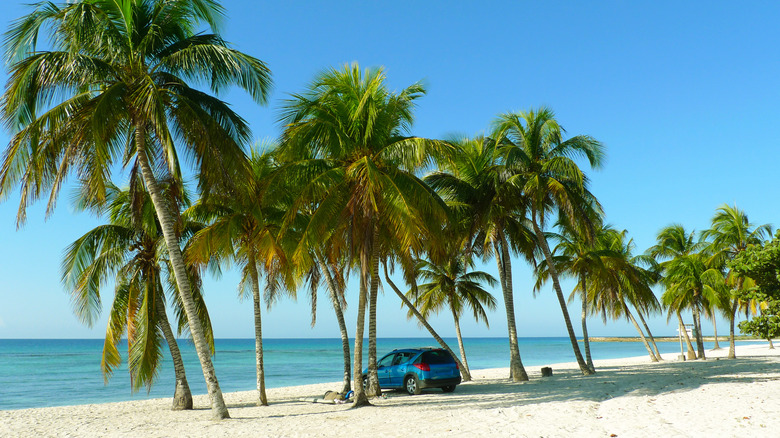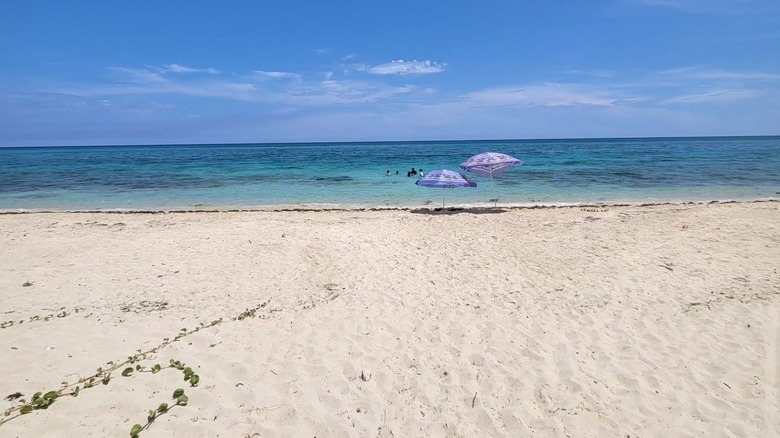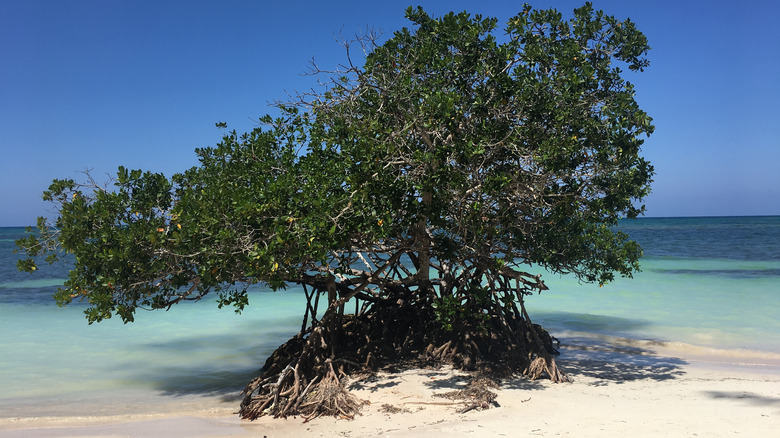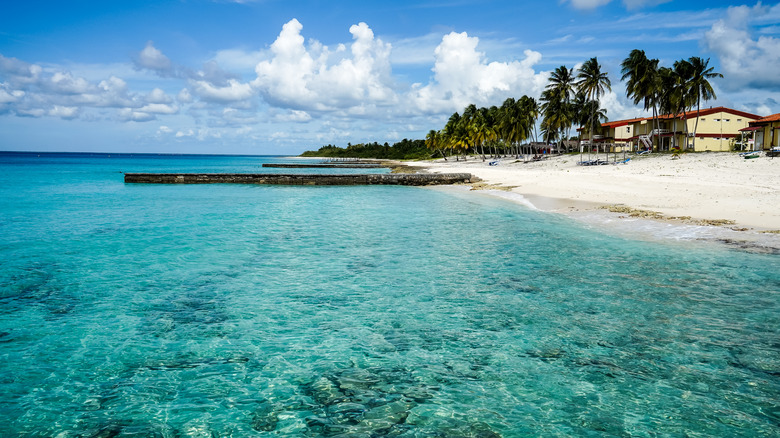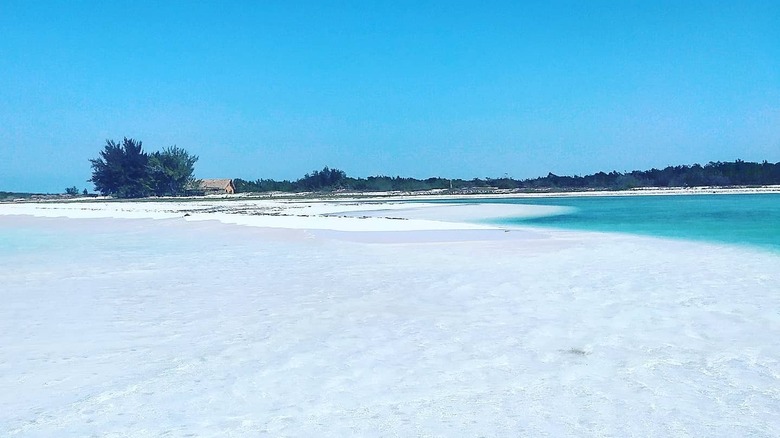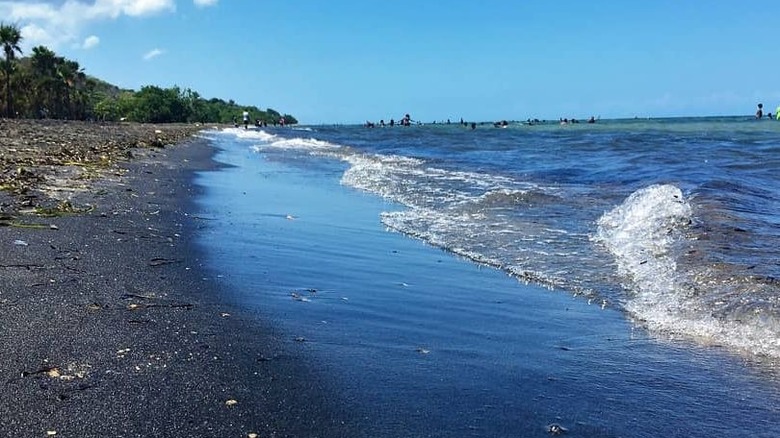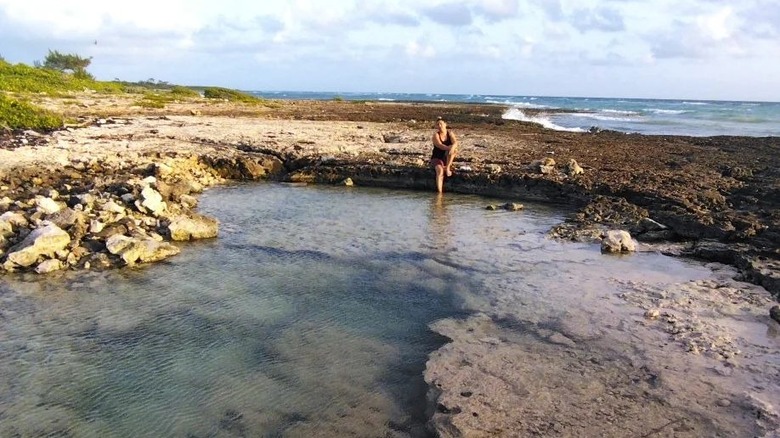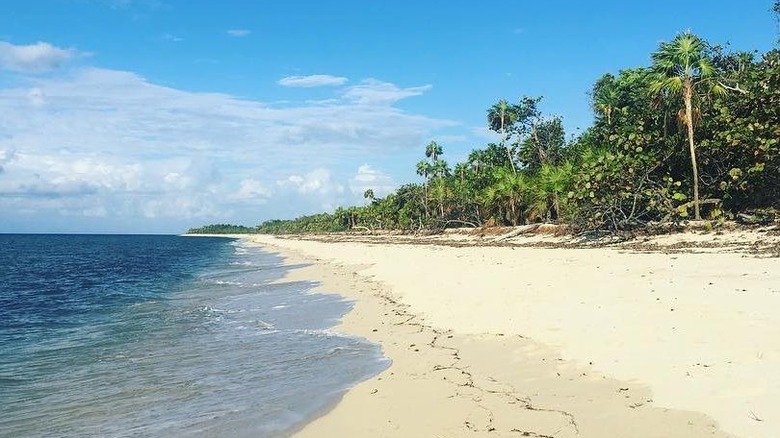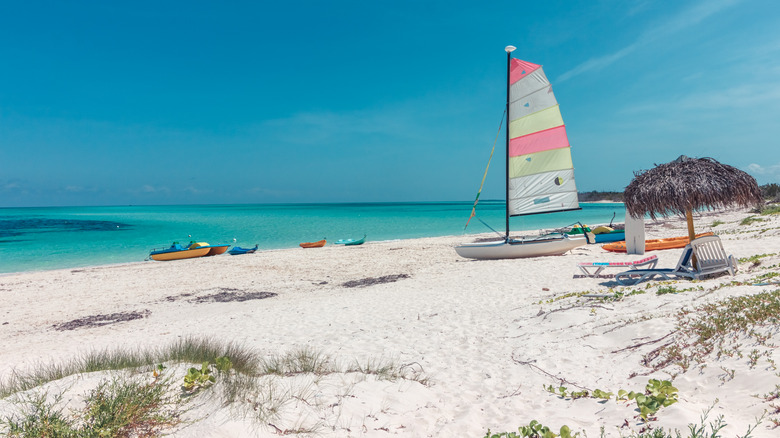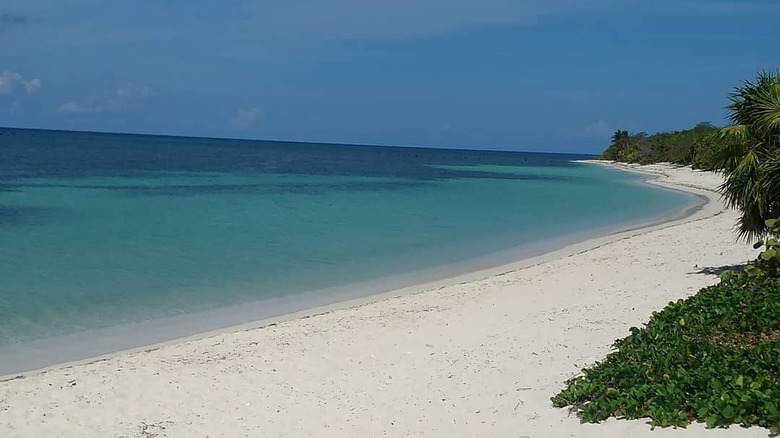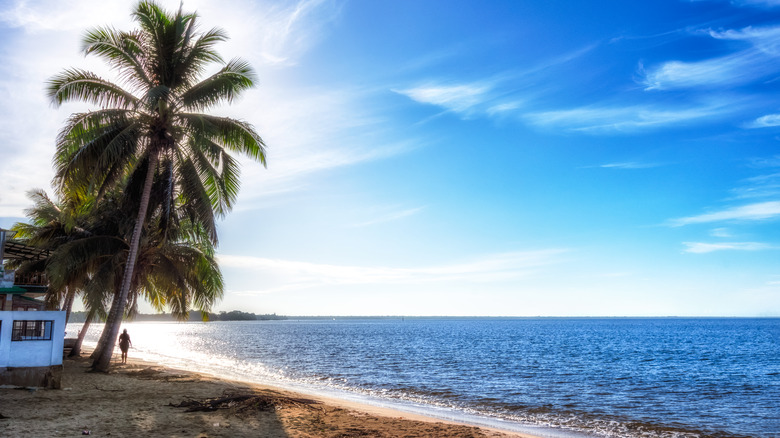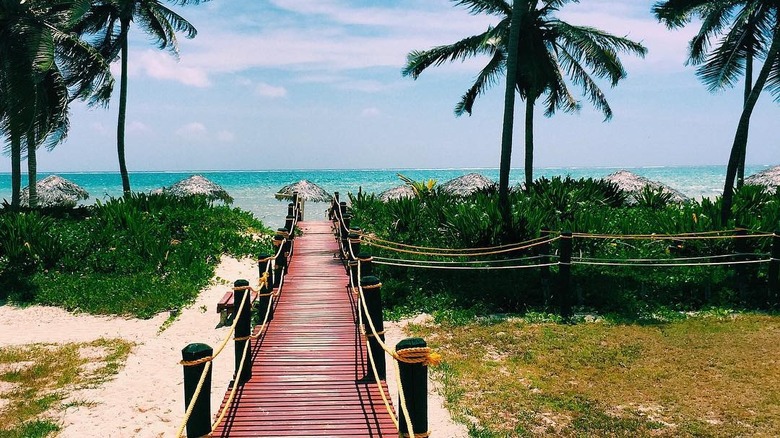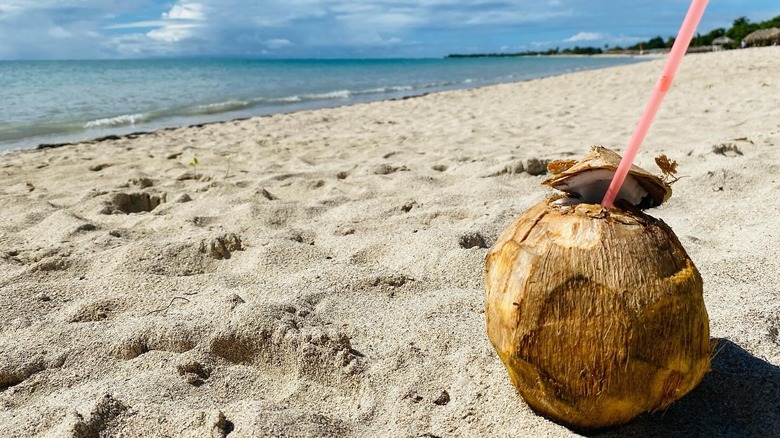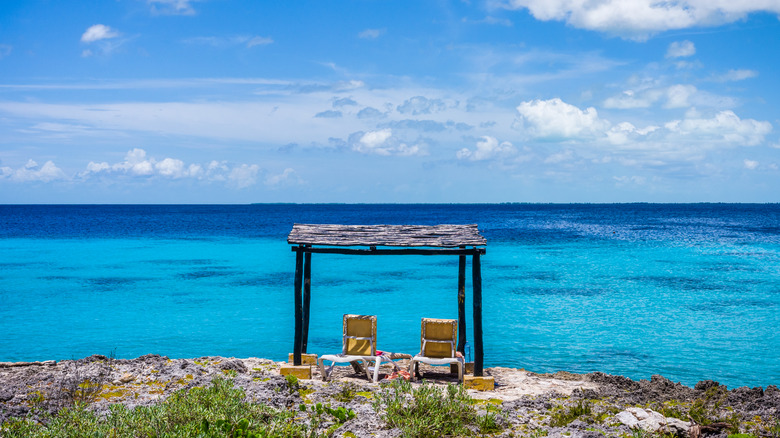Escape Crowds And Stay Warm This Winter At These Underrated Beaches In Cuba
The results of the 2023 Tripadvisor Traveler's Choice awards are in, and Cuba is the top trending destination. It's not surprising given the island has a fascinating history, warm and welcoming people, and what some consider the best under-the-radar beaches in the Caribbean. So many visitors to Cuba head straight to the resorts of Varadero or Cayo Coco and spend most of their time on the beaches there. However, the popularity of these areas means that those stretches of sand can be packed with tourists. If you want to chill out on a beach away from the crowds, there are tons of coastlines around the island that are less touristy and just as scenic, if not more so.
One thing that tourists visiting Cuba should be aware of is that it's relatively easy to travel around the country. Contrary to popular belief, tourists are welcome to get off the beaten path and visit remote beaches and small towns all over the main island and surrounding cays. If you do, you'll discover several seaside spots where you might just have an entire beach all to yourself. For those who don't want to share the sand with hordes of other travelers, these are some of the best underrated beaches in Cuba based on local recommendations from Cuban people, traveler recommendations on sites like Tripadvisor, and reports from travel bloggers who have traveled the island extensively.
Playa Maguana
It's a bit of a trek to get to Playa Maguana on Cuba's far northeast coast, but those who make the journey will be rewarded with a gorgeous strip of golden sand spilling into turquoise waters. It's about 12.5 miles from the town of Baracoa, which is the oldest colonial city on the island and a fascinating place to explore in itself. Offshore, there is a reef that protects the shore from wild waves. Swimming is possible in the calm waters, and it's a fabulous spot for some snorkeling. On the sand, you'll find mostly local people enjoying the fresh air and views.
There is one hotel close to the sands of Playa Maguana called Villa Maguana. It has air-conditioned rooms in wooden buildings, some of which offer ocean views. However, most tourists who visit Playa Maguana stay in Baracoa. The small city sits on the site where Christopher Columbus once landed in Cuba. It later became the site of the first Spanish settlement and then the capital city of the country. There are several hotels and restaurants in town, along with historic buildings and sites. Baracoa is also a great base to explore the lush jungles and mountains of eastern Cuba.
Playa Girón
Want to see the spot where the Cold War almost kicked into high gear? Playa Girón sits on the Bay of Pigs and was one of the sites where CIA-backed forces attempted to invade Cuba in April of 1961. A small museum in the town tells the story from the Cuban perspective. The beach and town were named after another ill-fated invader: Gilberto Girón, a French pirate who was beheaded on the beach in the 17th century. Despite its turbulent past, the town is pretty sleepy and a pleasant place to spend some beach time.
The beach has soft, golden sand and is fronted by a breakwater wall that keeps the water calm and safe for swimming. Hotel Horizontes Playa Girón is an all-inclusive resort that sits right on the beach, which is convenient for those who want to be close to the water. However, many Tripadvisor reviewers have commented that it is quite run-down, and recommend staying at a casa particular in the town instead. Casas particulares are private houses where locals rent out rooms, and Staying in one is a great way to connect with and support Cuban people.
Playa Jibacoa
Located halfway between Havana and Varadero on Cuba's northern coast, Playa Jibacoa is a beautiful spot to visit if you want a break from your resort or the capital city. The stunning white sand beach is backed by lush green hills and fronted by azure water. This is a prime spot for diving and snorkeling, as there are coral reefs just offshore that you can access directly from the beach. There is a dive center at the Memories Jibacoa resort where you can book trips and participate in diving certification courses.
There are several hotels and some rooms for rent in private homes close to Playa Jibacoa, as well as a few restaurants that serve seafood and Cuban dishes. If you prefer to stay in Varadero or Havana, the beach is an easy day trip. Playa Jibacoa is 36 miles from Havana, and it takes about an hour to drive there from the city. Varadero is a bit farther at 58 miles, and it takes about an hour and 25 minutes to drive. Both drives will take you along the coast, offering great views of the ocean and green hills of the Mayabeque province.
Cayo Jutías
Sugary white sand and crystal clear waters await at Cayo Jutías. This small island is located off Cuba's northwest coast and is connected to the mainland by a bumpy road. The main beach area has parasols, sun loungers, and two bars that sell cold drinks and snacks. It can get pretty busy, but if you trek through the mangroves to other parts of the island, you'll find slices of pristine sand all to yourself. Hike to the southwest corner of the island to see a lagoon filled with crabs and a beach where giant starfish lie in the water.
There is no accommodation on Cayo Jutías, so you'll have to visit it on a day trip. Many people visit from the town of Viñales, famous for its colonial buildings, tobacco plantations, and limestone karsts. There are several cliffs in the area that are great for rock climbing and many interesting caves to explore. The drive from Viñales to Cayo Jutías takes about one and a half hours, and there are plenty of taxi drivers in Viñales who can take you to the island. Most will wait for you while you explore the island and take you back in the afternoon. Just be aware that most drivers aim to leave around 4 p.m. to avoid driving after dark. If you want to stay for sunset, you may be stuck without a ride.
María La Gorda
Situated on the edge of a broad bay on Cuba's far western coast, María La Gorda is a diver's dream. The waters of the Bahía de Corrientes are home to the coolest sea caves and miles of coral reefs. Divers can see multitudes of marine life here, from lobsters to barracuda, green morays, and even the occasional nurse shark. The beach is part of the Guanahacabibes Peninsula National Park, so it's a protected area with some of the most pristine dive sites in the Caribbean.
The María La Gorda Hotel is the only place to stay in the area, and it's located just steps from the sand. It has a variety of rooms, two restaurants, a snack bar on the beach, and a dive center. There's not much to do here except dive and chill on the beach, which is perfect for those who want to switch off and go low-key. If you're feeling adventurous, you could search for buried treasure. The area was once popular with pirates, and some people believe they may have left some of their bounty hidden under the sand.
Punta Mal Tiempo
You won't find hotels, beach bars, or dive centers at Punta Mal Tiempo. Just a broad swathe of white sand lapped by calm waters. This pristine beach is on the southwestern coast of Cayo Largo del Sur and is worth a visit if you're staying at one of the hotels on the island. The name translates to "bad weather point," but in actuality, the beach gets tons of sunshine, and the waters are typically calm. You may see a few other people strolling along the dazzling white sand, but chances are you'll have at least a portion of the beach all to yourself.
Punta Mal Tiempo is just south of Playa Sirena and Playa Paraiso, both of which are popular beaches on Cayo Largo. You can reach it via a sandy trail leading towards the water from the main road. There are only a few palapas on the sand and some sun loungers you can rent for the day. Other than that, there is very little shade on the beach and no facilities, so you'll want to bring plenty of sunscreen, water, and possibly something to eat. Swimming is possible, and there is a coral reef just offshore.
Playa Bibijagua
Unlike many other beaches in Cuba, Playa Bibijagua has black sand. And, unlike many other black sand beaches worldwide, the sand is not volcanic. It actually comes from eroded stone from the Bibijagua mountains. The dark tones contrast beautifully with the deep blue of the ocean and the greenery backing the beach. You'll probably find more locals than tourists on the beach and plenty of open spaces to set up a blanket on the sand or the grass under trees for shade.
Playa Bibijagua is located on the northeastern coast of the Isla de la Juventud. This is the second largest island in Cuba after the main island. It's an interesting place with dense forests and rugged coves that used to be pirate havens. The easiest way to get to Playa Bibijagua is from the city of Nueva Gerona. The beach is only about 5 miles from the city, and along the way, you can stop at the Presidio Modelo, which features unique circular buildings. The compound was once used as a jail that could hold up to 5,000 prisoners. Former presidents (and brothers) Fidel and Raúl Castro were imprisoned there from 1953 to 1955.
Playa Caletones
If you're staying in Holguin province and want to escape the crowds of the city or the big resorts along the coast, Playa Caletones makes for a refreshing break. The beach is long and wide with golden sand, and the water is clear enough for snorkeling. Chill out under a palapa on the sand or stroll along the rocks on either side of the beach. If you're feeling adventurous, ask the locals to take you to the freshwater pools and cave systems inland.
Less than 3 miles inland from Playa Caletones is the Caverna Tanque Azul, a massive cenote filled with cool, fresh water. Divers can go below the surface to explore the caverns filled with stalagmites and stalactites. Poza Fría and Poza Bella are smaller pools in the rocks that are closer to Playa Caletones and worth a visit. The beach and cenotes are located on Holguin's northern coast, about 45 miles from the resort town of Guardalavaca.
Playa Las Tumbas
If you really want to get off the beaten path and play Robinson Crusoe, make your way to Playa Las Tumbas. It sits on the far western tip of Cuba on the Guanahacabibes Peninsula, and it offers nothing but sand, palm trees, and the ocean. It's rare to find many people on the beach, so you'll have plenty of space to spread out and explore. There are no facilities on the beach, though, so come prepared.
Playa Las Tumbas is a bit of a trek from points further east. It takes about five and a half hours to drive there from Havana. Villa Cabo San Antonio is the only hotel on the beach, offering 16 cabins, a restaurant, and a snack bar. Just across the northern tip of the peninsula is the Gaviota Cabo de San Antonio Marina, which has a long pier for setting off on diving trips. If you decide to stay a few days in the Las Tumbas area, set aside some time to explore the beautiful nature trails in the Guanahacabibes Biosphere Reserve.
Cayo Levisa
Far from Cuba's bustling beach resorts, Cayo Levisa is a small island that can only be reached by ferry. It's part of the Los Colorados Archipelago, which stretches along the northwest coast of Cuba and consists of over 160 keys. On Cayo Levisa, you'll find a long white sand beach on the northern side of the island with swaying palm trees. On the southern side, there are mangroves that attract seabirds and schools of fish.
If you want to stay overnight on the island, Hotel Cayo Levisa is the only accommodation option. It has cozy cabins, a restaurant, and a beach bar. Guests can rent kayaks and paddle boards from the island's sports center. If you want to explore fascinating underwater worlds off the coast of the island, the Cayo Levisa International Dive Center offers excursions and dive courses. There are several coral reefs offshore that teem with marine life, like sea fans and lobsters. There are also shipwrecks that date back to the 17th and 18th centuries.
Playa Punta Francés
Named after a French pirate, this small beach on Isla de la Juventud is home to sea turtles, parrots, and some incredible underwater worlds. It's part of the Punta Francés National Marine Park, which is cloaked in mangroves and ringed with deserted coves. Offshore, you'll find shipwrecks, underwater caves, and all manner of marine life. The water is calm and clear, which is excellent for snorkeling, and many dive sites are easily accessible from the beach.
Playa Punta Francés is not the easiest beach to find or access, so it tends to get fewer crowds than other beaches on Isla de la Juventud. Located about 14 miles north of the fishing village of Cocodrilo on the far southwestern edge of the island, the beach stretches for about 2 miles and is backed by tropical vegetation. There is a small bar on the beach where you can grab cold drinks, but not much else around, so you might want to bring your own snacks.
Playa Larga
If you're looking for a laid-back beach town in Cuba where you're not totally isolated but also not surrounded by mega-resorts, Playa Larga is a good option. This charming fishing village on the Bay of Pigs has inviting beach bars, seafood restaurants, and casas particulares where you can stay in an actual home as opposed to a hotel. There are also Airbnb properties available for rent. The vibe here is much more local than many of Cuba's resort towns, which is excellent for those who want to experience authentic Cuban culture.
Playa Larga is the name of the beach and the town that hugs the top of the bay. The beach itself is a flat expanse of white sand lapped by turquoise waters. The water is generally very calm, and there is a coral reef very close to the shore where you can snorkel to see tropical fish. The town is also close to the Ciénaga de Zapata National Park, a UNESCO Biosphere Reserve. The park features a wealth of natural beauty, including mangrove forests, underwater canyons, and grasslands.
Cayo Sabinal
It's easy to see why Ernest Hemingway was enraptured with Cayo Sanibal. This jewel off the north coast of the main island has beautiful beaches and is surrounded by fish-filled waters. It's perfect for nature lovers because it has wild areas with swamps, forests, and mangroves that are home to wild boar, deer, and tocororo birds. It also has a flock of resident flamingos. The island is part of the Jardines del Rey archipelago, and it's connected to the main island by a road.
There are no hotels on Cayo Sabinal, so most people visit on a day trip from other areas. The nearby town of Santa Lucia has several hotels and resorts, making it a great spot to base yourself if you want to explore the Jardines del Rey. Playa Bonita is the most popular beach on the Cayo Sabinal, and it has a restaurant where you can grab lunch. Playa Pinos, another beach, is accessed via a rugged dirt road and is well worth the effort if you want to escape the crowds. It may just be one of the quietest destinations you find on your trip.
Playa Ancon
Located just a short drive from the beautiful colonial town of Trinidad, Playa Ancon is one of the better beaches on Cuba's southern coast. It's not a secret by any means, but it's big enough that you'll most likely be able to find a quiet spot to chill away from crowds. There are restaurants along the sand where you can grab a bite and watch boats ply the calm waters. There are also chairs and umbrellas you can rent, as well as trees offering some shade.
Playa Ancon is about a five-hour drive from Havana, so you'll probably want to stay in one of the resorts right on the beach or in the nearby town of Trinidad. All-inclusives at Playa Ancon include Memories Trinidad del Mar and the Club Amigo Ancon. If you decide to stay on the beach, try to carve out some time to visit Trinidad. It's a UNESCO World Heritage Site with interesting colonial buildings, many of which were connected to the sugar trade.
How we chose these underrated beaches in Cuba
As the biggest island in the Caribbean, Cuba has no shortage of beaches you can chill out on. However, we wanted to highlight some of the lesser-known beaches and stretches of sand where you're most likely to have plenty of space all to yourself. To narrow the options, we reviewed travel blogs to get insider information from Cuban people and travelers who got off the beaten path. We also looked at reviews from Tripadvisor to see what people's experiences were like. If numerous people mentioned how uncrowded or peaceful a particular beach was, we considered it for our list. Our final picks are the top under-the-radar beaches recommended by people in the know.
